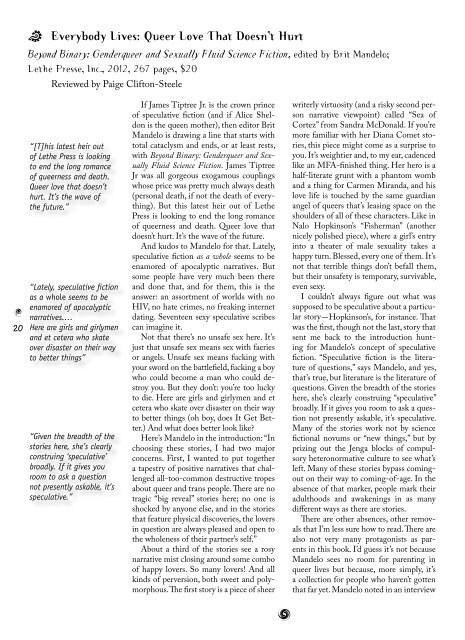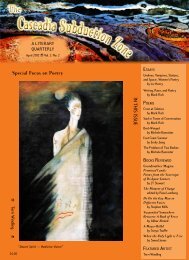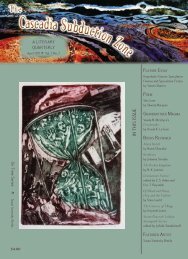Subduction
Vol. 2 No. 3, Jul. 2012 - The Cascadia Subduction Zone
Vol. 2 No. 3, Jul. 2012 - The Cascadia Subduction Zone
- No tags were found...
You also want an ePaper? Increase the reach of your titles
YUMPU automatically turns print PDFs into web optimized ePapers that Google loves.
y Everybody Lives: Queer Love That Doesn’t Hurt<br />
Beyond Binary: Genderqueer and Sexually Fluid Science Fiction, edited by Brit Mandelo;<br />
Lethe Presse, Inc., 2012, 267 pages, $20<br />
Reviewed by Paige Clifton-Steele<br />
H<br />
20<br />
“[T]his latest heir out<br />
of Lethe Press is looking<br />
to end the long romance<br />
of queerness and death.<br />
Queer love that doesn’t<br />
hurt. It’s the wave of<br />
the future.”<br />
“Lately, speculative fiction<br />
as a whole seems to be<br />
enamored of apocalyptic<br />
narratives.…<br />
Here are girls and girlymen<br />
and et cetera who skate<br />
over disaster on their way<br />
to better things”<br />
“Given the breadth of the<br />
stories here, she’s clearly<br />
construing ‘speculative’<br />
broadly. If it gives you<br />
room to ask a question<br />
not presently askable, it’s<br />
speculative.”<br />
If James Tiptree Jr. is the crown prince<br />
of speculative fiction (and if Alice Sheldon<br />
is the queen mother), then editor Brit<br />
Mandelo is drawing a line that starts with<br />
total cataclysm and ends, or at least rests,<br />
with Beyond Binary: Genderqueer and Sexually<br />
Fluid Science Fiction. James Tiptree<br />
Jr was all gorgeous exogamous couplings<br />
whose price was pretty much always death<br />
(personal death, if not the death of everything).<br />
But this latest heir out of Lethe<br />
Press is looking to end the long romance<br />
of queerness and death. Queer love that<br />
doesn’t hurt. It’s the wave of the future.<br />
And kudos to Mandelo for that. Lately,<br />
speculative fiction as a whole seems to be<br />
enamored of apocalyptic narratives. But<br />
some people have very much been there<br />
and done that, and for them, this is the<br />
answer: an assortment of worlds with no<br />
HIV, no hate crimes, no freaking internet<br />
dating. Seventeen sexy speculative scribes<br />
can imagine it.<br />
Not that there’s no unsafe sex here. It’s<br />
just that unsafe sex means sex with faeries<br />
or angels. Unsafe sex means fucking with<br />
your sword on the battlefield, fucking a boy<br />
who could become a man who could destroy<br />
you. But they don’t: you’re too lucky<br />
to die. Here are girls and girlymen and et<br />
cetera who skate over disaster on their way<br />
to better things (oh boy, does It Get Better.)<br />
And what does better look like?<br />
Here’s Mandelo in the introduction: “In<br />
choosing these stories, I had two major<br />
concerns. First, I wanted to put together<br />
a tapestry of positive narratives that challenged<br />
all-too-common destructive tropes<br />
about queer and trans people. There are no<br />
tragic “big reveal” stories here; no one is<br />
shocked by anyone else, and in the stories<br />
that feature physical discoveries, the lovers<br />
in question are always pleased and open to<br />
the wholeness of their partner’s self.”<br />
About a third of the stories see a rosy<br />
narrative mist closing around some combo<br />
of happy lovers. So many lovers! And all<br />
kinds of perversion, both sweet and polymorphous.<br />
The first story is a piece of sheer<br />
writerly virtuosity (and a risky second person<br />
narrative viewpoint) called “Sea of<br />
Cortez” from Sandra McDonald. If you’re<br />
more familiar with her Diana Comet stories,<br />
this piece might come as a surprise to<br />
you. It’s weightier and, to my ear, cadenced<br />
like an MFA-finished thing. Her hero is a<br />
half-literate grunt with a phantom womb<br />
and a thing for Carmen Miranda, and his<br />
love life is touched by the same guardian<br />
angel of queers that’s leasing space on the<br />
shoulders of all of these characters. Like in<br />
Nalo Hopkinson’s “Fisherman” (another<br />
nicely polished piece), where a girl’s entry<br />
into a theater of male sexuality takes a<br />
happy turn. Blessed, every one of them. It’s<br />
not that terrible things don’t befall them,<br />
but their unsafety is temporary, survivable,<br />
even sexy.<br />
I couldn’t always figure out what was<br />
supposed to be speculative about a particular<br />
story — Hopkinson’s, for instance. That<br />
was the first, though not the last, story that<br />
sent me back to the introduction hunting<br />
for Mandelo’s concept of speculative<br />
fiction. “Speculative fiction is the literature<br />
of questions,” says Mandelo, and yes,<br />
that’s true, but literature is the literature of<br />
questions. Given the breadth of the stories<br />
here, she’s clearly construing “speculative”<br />
broadly. If it gives you room to ask a question<br />
not presently askable, it’s speculative.<br />
Many of the stories work not by science<br />
fictional novums or “new things,” but by<br />
prizing out the Jenga blocks of compulsory<br />
heteronormative culture to see what’s<br />
left. Many of these stories bypass comingout<br />
on their way to coming-of-age. In the<br />
absence of that marker, people mark their<br />
adulthoods and awakenings in as many<br />
different ways as there are stories.<br />
There are other absences, other removals<br />
that I’m less sure how to read. There are<br />
also not very many protagonists as parents<br />
in this book. I’d guess it’s not because<br />
Mandelo sees no room for parenting in<br />
queer lives but because, more simply, it’s<br />
a collection for people who haven’t gotten<br />
that far yet. Mandelo noted in an interview<br />
n




